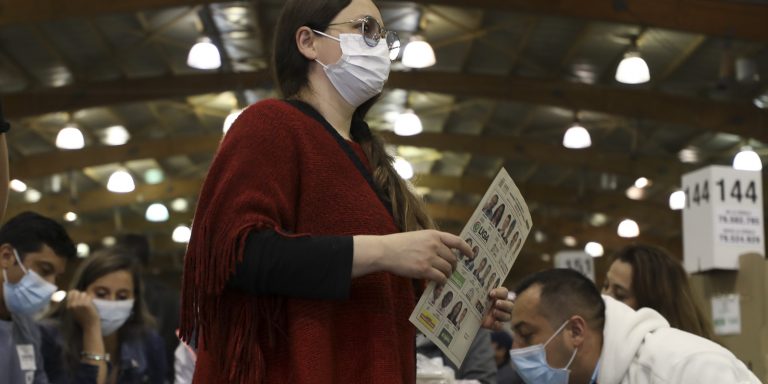INTELBRIEF
June 1, 2022
IntelBrief: Shakeup in Colombia Elections as Old Guard Outflanked on Both Sides

Bottom Line Up Front
- The first round of elections in Colombia ended with two anti-establishment candidates moving on to a runoff election scheduled for June 19, after the continuity candidate fell far short of what many political analysts had projected.
- Overall, the election results suggest waning influence of the traditional conservatism popular in Colombia for decades, and closely associated with former Colombian president Alvaro Uribe.
- Increasing poverty and widening socio-economic inequality have been byproducts of the pandemic, leading to widespread unemployment and a shrinking of the formal economy.
- A shift toward leftist politics could jeopardize Colombia’s relationship with the United States, which has been a strong partnership for the past two decades.
The first round of elections in Colombia ended with two anti-establishment candidates moving on to a runoff election scheduled for June 19, after the continuity candidate fell far short of what many political analysts had projected. The top candidate following last weekend’s contest, receiving 40.3% of the vote, was Gustavo Petro, a leftist, ex-mayor of Bogota and former senator. He was also, in his younger years, a guerilla member of the 19th of April Movement (M-19), an insurgent group that went on to become involved in politics. Colombian voters’ acceptance of Petro may reflect a softening of popular attitudes toward leftist policies previously associated with rebel movements. Far-right populist Rodolfo Hernandez, a real estate tycoon and construction magnate running on an anti-corruption platform, came in second, receiving 28.1% of the vote. Hernandez put together an effective campaign strategy which included outreach to different demographic groups on social media. Hernandez has spoken about declaring a state of emergency and taking other drastic measures to stem corruption and wasteful government spending, suggesting a more illiberal agenda than most Colombians are comfortable with. Some have labeled Hernandez “the Colombian Donald Trump.” Hernandez was not formally affiliated with one of Colombia’s major political parties and cast himself as an “outsider” who could assume office and clean up government.
The “establishment” candidate, Federico Gutierrez, finished four percentage points behind Hernandez at approximately 24%. Heading into the election in a few weeks, Hernandez will be working assiduously to cobble together votes from those who previously supported Gutierrez. Even Gutierrez has backed Hernandez, suggesting that by doing so he is attempting to prevent Colombia from democratic backsliding and broader instability. Despite Gutierrez’s backing, beyond the issue of corruption, Hernandez’s campaign platform is short on concrete policy proposals. Overall, the election results suggest waning influence of the traditional conservatism popular in Colombia for decades, and closely associated with former Colombian president Alvaro Uribe. Outgoing President Ivan Duque’s tenure has been marked by sporadic protests against declining standards of living and increased tax hikes with few tangible benefits to everyday Colombians and the middle class. Petro tailored his political campaign to attract younger voters, including many that formed the backbone of these protests. Some have been highly critical of the way Duque’s administration dealt with the Revolutionary Armed Forces of Colombia (FARC) during peace negotiations.
In recent years, Colombia has been plagued by rising violence and an erosion of popular trust in longstanding institutions, including the government, the church, and the military. This erosion of trust has in part been triggered by the coronavirus pandemic, which has affected all aspects of life in Colombia. These effects have been particularly acute within the Colombian economy, which Petro made a centerpiece of his campaign. Increasing poverty and widening socio-economic inequality have been byproducts of the pandemic, leading to widespread unemployment and a shrinking of the formal economy. Costs are rising, social services lacking, and wage growth remains stagnant. Though Colombia’s economy has fared better than some of its regional neighbors, it has been impacted by rising inflation. Still, there are high expectations for future growth, with some forecasts predicting nearly 6% growth in 2022. A Petro presidency would be unwelcome news for international investors, who would likely balk at his promises of tax hikes and heavier regulation of the market economy. Petro has been highly critical of Colombia’s capitalist economic model, consonant with a wave of other leftist politicians throughout South America. He has also suggested that under his leadership, Colombia would move swiftly away from the oil and coal industries.
A shift toward leftist politics could jeopardize Colombia’s relationship with the United States, which has been a strong partnership for the past two decades. It would also represent a new phase for Colombia, which has typically been governed by conservatives and liberals. Left-wing leaders, meanwhile, have historically ruled in other Latin American nations, including Argentina, Brazil, Chile, Mexico, Peru, and Venezuela. If Petro were to win the runoff, Colombia would join a growing list of Latin American countries to elect leftist leaders in recent years. Washington would prefer a Hernandez presidency over a Petro presidency in Colombia, due to latter’s expressed opposition to U.S. drug policy and relations with rogue states in the region, from Cuba to Venezuela. A Petro presidency would also likely present an opportunity for China and Russia to expand their influence in Latin America, a geopolitical shift that may have significant implications in an era of renewed strategic competition.